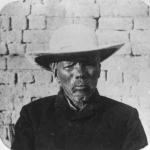Quote:
Witbooi to Leutwein: (…) The fact that I do not want to be subordinate to the German Emperor is not a sin, guilt or dishonour that justifies you imposing the death penalty on me. I beg you again, dear friend, (…) do not attack me and leave me in peace. Leutwein to Witbooi: The fact that you don’t want to submit to the German Reich is neither a sin nor a fault, but it is dangerous for the existence of the German protectorate. So (…) all further letters in which you do not offer me your submission are useless.
Source:
Der Spiegel 13/1985.
Author Bio:
Hendrik Witbooi, actually ǃNanseb ǀGabemab (ca. 1830-1905) was, from the end of 1888, the captain of the Orlam people, the Witbooi, who were related to the Nama.
Context:
 Theodor Gotthilf Leutwein was commander of the Kaiserliche Schutztruppe and governor of German South West Africa. Hornkranz (in today's Namibia) is known for a colonial massacre which took place in 1893 in which 80 Witbooi fighters were killed and 40 women and children abducted under Leutwein's command. Kaptein Hendrik Witbooi is viewed and celebrated as the first African leader to mount armed resistance against the German colonialists. What is interesting in this exchange of letters is that in Leutwein's replies, those affected by colonisation are held equally responsible for the brutality that was part and parcel of colonial conquest. Leutwein describes Witbooi's "stubbornness" as irrational behaviour that endangered peace in the German protectorate. In this way, Witbooi is also held responsible for the war and murder of the Witboois. Then as now, the strategy pursued was one that sought to preserve prosperity and peace in Germany at the expense of the Global South. Even today, resistance to colonial rule is hardly discussed in local history books and is therefore not given the value it deserves. Instead, the fairy tale of equal trade relations and voyages of discovery is still being told. Witbooi died in 1904, in fighting against German colonial power.
Theodor Gotthilf Leutwein was commander of the Kaiserliche Schutztruppe and governor of German South West Africa. Hornkranz (in today's Namibia) is known for a colonial massacre which took place in 1893 in which 80 Witbooi fighters were killed and 40 women and children abducted under Leutwein's command. Kaptein Hendrik Witbooi is viewed and celebrated as the first African leader to mount armed resistance against the German colonialists. What is interesting in this exchange of letters is that in Leutwein's replies, those affected by colonisation are held equally responsible for the brutality that was part and parcel of colonial conquest. Leutwein describes Witbooi's "stubbornness" as irrational behaviour that endangered peace in the German protectorate. In this way, Witbooi is also held responsible for the war and murder of the Witboois. Then as now, the strategy pursued was one that sought to preserve prosperity and peace in Germany at the expense of the Global South. Even today, resistance to colonial rule is hardly discussed in local history books and is therefore not given the value it deserves. Instead, the fairy tale of equal trade relations and voyages of discovery is still being told. Witbooi died in 1904, in fighting against German colonial power.Further Reading:
*Reinhard Koesseler (2007): Genocide, Apology and Reparation – the linkage between images of the past in Namibia and Germany.
Year:
1894